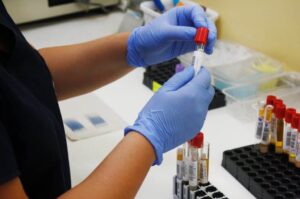Dealing with a child custody dispute and a court-ordered drug test can be highly stressful. However, being prepared and understanding what to expect can help make the procedure go more smoothly. If you’re the parent asking for the drug test or the court-ordered drug test, understanding a few fundamental facts about the procedure may make your experience easier.
Overview of a Court-Ordered Drug Test
Court-ordered drug tests are drug or alcohol tests that people must submit in order to comply with a legal requirement that they stay drug-or-alcohol-free. Drug testing may be legally needed in a variety of scenarios. The scenarios include divorce settlements, DUI or DWI charges, probation, pre-trial programs, and child custody arrangements. The frequency and parameters for drug and alcohol testing are frequently determined by a court order or agreement. Testing is frequently required following offenses such as driving while inebriated or under the influence of drugs or alcohol.
The result of a court-ordered drug and alcohol test can have a significant impact on legal and judicial procedures. The findings of court-ordered drug and alcohol tests might mean the difference between spending time in jail or not. They can also affect driving privileges, child custody, visitation rights, and other liberties; getting the job done correctly from start to finish is critical.
Drug and alcohol testing is becoming more common in court. There are numerous circumstances in which someone may be legally obligated to submit to drug testing, including:
- Child custody disputes: Issues of drug or alcohol usage or abuse among one or both former spouses may be addressed in judgments for the best interests of the child in legal battles for child custody.
- DUI or DWI arrests: DUI or DWI arrests or convictions frequently necessitate court-ordered drug and alcohol testing.
- Probation testing. Mandatory testing as a condition of probation is common in federal, county, and drug courts in the United States.
- And even more.
Which tests should you get?
Administrative court decisions frequently describe the frequency and standards for court-mandated drug and alcohol testing requirements. A sample of your hair or urine is routinely used for court-ordered drug and alcohol testing. Some court-mandated testing necessitates the use of observed collections, but most do not.
Your attorney, probation officer, or another legal contact can advise you on which tests to order. It is critical to document the testing specifications. There are hundreds of drug and alcohol tests available, so it’s critical that you know which one you need.
How Does Court-Ordered Drug Test Work?
If you are obliged to submit to drug testing for legal reasons, it is critical that you understand what constitutes legally admissible test results. Because of the many difficulties with potential contamination or tampering of samples and results, home tests and mail-in services cannot be used for court reasons. You must instead select an approved lab, such as ARCpoint Labs of Santa Fe Springs, to properly give your test in a neutral atmosphere. The final results are accepted as usable evidence in a court of law because trained technicians have the knowledge and skill to correctly collect and manage samples, as well as to conduct the court ordered drug test procedure.
When a judge rules that drug testing is a valid request, the court ordered drug test procedure must be carried out according to federal guidelines. It will be done in the least intrusive manner possible. A simple urine test is usually selected over more invasive procedures such as hair follicle or blood testing.
Procedure for a Court-Ordered Drug Test
A court-ordered or probation drug test can be given on a regular or random basis. However, a combination of both is likely to yield the best results. Much of this may also be determined by an offender’s prior history, with more regular testing required in cases involving prior drug use.
The types of substances that can be tested for in probation drug testing are completely adjustable. It can be adjusted based on the offender and the jurisdiction. Administrators can run a screening for popular illegal substances like marijuana or prescription drugs like opioids by specifying a certain number of drugs, or “panels”. The panel drug test tests for numerous types of drugs from a single sample, making it very easy to administer. The most typical drug test panel for probation drug testing is a five-panel drug test that includes:
- Amphetamines (AMP) (including MAMP-Methamphetamine, MDMA-Ecstasy)
- COC-Cocaine
- Opiates (OPI) (including codeine, morphine, and heroin)
- PCP-Phencyclidine
- THC-Marijuana.
After the sample is collected, it is sent to a SAMHSA-certified laboratory for testing. The laboratory data is then sent to an experienced medical review officer (MRO). They will evaluate the results and notify you of any negative or positive test results. They will also show you at which point you can take the appropriate action. We have four full-time MROs assessing results at National Drug Screening, with over 60 years of combined professional expertise.
Read also: Does Phentermine Show Up On A Drug Test?
Hair and Urine Testing Ordered by the Court
The hair follicle and urine drug testing are frequently required in the court-ordered drug test, legal-ordered drug tests, and requests from lawyers. To be eligible for hair follicle drug testing, you must have hair on your head, arms, or legs. Some facilities may demand head hair. So inform the drug testing specialists if you have at least 1.5 inches of hair on your head. Hair tests are sometimes requested by probationers. Hair tests are popular among probation officials because they are exceedingly difficult to beat. It can detect drug usage over a 90-day period. If you require a urine drug test, you can select from a variety of panels that include various substances, alcohol, ETG, widely abused prescription medicines, and more.
Probationary Drug Testing
Drug and alcohol testing for probation is a regular practice in federal, county, and drug courts across the United States. Periodic probation drug testing is frequently ordered by the court for offenders who are given the option of probation rather than a jail term. A drug court, probation officer, or parole officer may mandate probation drug testing if it is unlikely that an individual will remain free of illegal substance use or alcohol misuse in order to comply with the requirements of a criminal sentence agreement. Programs frequently rely on your history, compliance with any criteria or restrictions, and confidence with your probation officer to determine how frequently they’ll drug test you. A parole officer may choose to drug test you every time you come in if there is any suspicion of your activity.
Your probation officer will advise you on which tests to order. Most situations will require you to take a specific testing panel. To screen for drug and alcohol usage, courts frequently utilize urine, hair, breath, or blood.
Courts frequently order random drug and alcohol testing as part of probation. Court-ordered testing can be done at random or on a set timetable. Probationary testing is typically administered at random to prevent the probationer from preparing for the test by flushing their system, substituting a sample, or intending to adulterate the specimen. In many cases, a combination of random and regular testing is most successful.
DUI/DWI Testing
Individuals suspected of, convicted of, or pleading guilty to a DWI/DUI offense are frequently obliged to submit to drug and/or alcohol testing. Driving while intoxicated (DWI) is the crime of operating a vehicle when impaired by alcohol or other substances (including recreational and prescription medicines) to the point where the driver is incapable of operating a motor vehicle safely. Individuals who are convicted of several DUI crimes are most likely suffering from alcoholism or substance misuse. So, they will require regular drug and alcohol testing.
You may be compelled to undergo an alcohol or drug test if you are involved in a DUI or DWI case for court, probation, or other legal reasons.
There are several methods for accurately screening for alcohol usage, including:
- Urine
- Hair
- Breath
Read Also: What Happens When You Get A DUI? Penalties Explained
Ethyl Glucuronide (EtG) or ethanol can also be tested at US Drug Test Centers. When getting your test, please mention which type of alcohol test you want when buying your test.
Ethyl Glucuronide (EtG) is an ethanol metabolite. It is the principal biomarker used to identify ethanol, a component of beer, wine, and liquor that is formed by the fermentation of yeast, sugars, and starches. An EtG test is extensively used to identify the presence of ethyl glucuronide, a byproduct of ethanol and the intoxicating element in alcohol. The major objective of an EtG test is to confirm that a person has abstained from alcohol usage. This is usually a requirement of the courts or substance abuse rehabilitation programs.
By far the most prevalent approach for detecting recent alcohol intake is breath alcohol testing. Breath alcohol testing, which is widely used in employment substance abuse screening programs and by law enforcement in cases of Driving Under the Influence (DUI) or Driving While Intoxicated (DWI), can identify the current level of impairment or intoxication.
A trained breath alcohol technician (BAT) uses an Evidential Breath Testing (EBT) instrument to do breath alcohol testing. A breathalyzer study of your exhaled breath will provide you with a numerical figure for your blood alcohol level (BAC) based on the concentration of alcohol in a portion of your exhaled air.
Court Ordered Drug Test for Child Custody Case
It is not commonplace for legal parties to seek court-ordered drug tests in cases involving child custody disputes in order to protect children. Testing results are frequently used to confirm or refute a person’s fitness as a parent. Also, they may be used to determine an initial custody arrangement or as part of an ongoing random drug testing program. Spouses may be required to submit to a single court-ordered drug test, random drug testing over a fixed length of time, or testing before exercising visiting rights.
What to Expect from a Drug Test Ordered by a Court
Dealing with a child custody case and a court-ordered drug test can be highly stressful. However, being prepared and understanding what to expect can help make the court ordered drug test procedure go more smoothly. Whether you’re the parent who requests the drug testing order or you’ve been ordered to undergo testing yourself, knowing a few basic facts about the procedure may make your experience easier.
When is a Court-ordered Drug Test used in Child Custody Case?
According to the California Family Code Section 3041.5, a court can make an order for drug testing of a parent during custody, visitation, and/or guardianship proceedings. A court can only order testing if there is particular proof of frequent and habitual unlawful drug usage. One (or both) of the child’s parents can request court-ordered drug testing, but a simple accusation is insufficient; specific evidence must be supplied. Testing may also be required in rare circumstances to establish excessive alcohol consumption.
If you request drug testing, be prepared to provide actual evidence of unlawful drug use. Document every case of drug use that you are aware of, and only include facts. Notes on behavioral changes are insufficient to persuade the court.
What Happens If You Test Positive for Drugs on a Court-Ordered Drug Test?
If you test positive for drugs in a custody-related, court-ordered drug test, you have the right to appeal the results, according to California law. According to state law, a positive test result will not be the primary basis for determining a custody decision. In general, the family court will consider several variables in addition to the drug test results in order to make a judgment that is in the best interests of the child in question.
However, a positive drug test may result in modified custody or visitation for at least a limited period of time until the court can determine the appropriate next measures.


